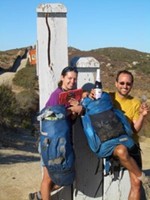
I can describe ultralight backpackers accurately, because, sadly, I am one.
Indeed, I’m cursed with this ridiculous compulsion to chop every useless gram off my gear list. My talent for doing this made lightweight backpackers more interested in my Continental Divide Trail gear list than in the excitement of being the first person to yo-yo the CDT.
As a result, some backpackers ask me to examine their gear list and advise them on how to reduce their overall weight. However, before doing that, I ask them to send me a full body photo of themselves. Why?
Because there is one secret to lightweight backpacking that we avid lightweight backpackers never talk about: our own weight reduction!
Many books on backpacking allude to the importance of being in shape. However, given the amount of pages they devote on reducing pack weight, I wonder if it would be wiser to spend a few more pages talking about the importance of losing body fat.
There are three reasons why losing a kilo of body fat is not as effective (hiking-wise) as a kilo of pack weight:
- Your body has become accustomed to carrying its weight around
- The extra weight is held tight to the body (vs. hanging over on the side)
- Our body fat is distributed throughout our body.
A backpack, on the other hand, is a foreign object that hangs off of us. The closer a weight is to our body, the easier it is to carry around. Since body fat is in our body, nothing could be easier to carry. Your one-kilo sneakers strapped on your backpack are more stressful to carry than one-kilo of body fat in your waist.
However, how often have you seen this: the hiker who is 30 pounds overweight obsessing about shaving off an ounce from his toothbrush or using titanium stakes?
I feel rude pointing out that he would do better shaving off 10 pounds from his tummy!
Obesity is common in my family, but I've always been active and thin. To make up for my lack of personal knowledge, I've asked many backpackers who have lost weight to describe how the weight loss impacted their backpacking experiences.
The vast majority said that backpacking was much easier once they lost weight. However, some thought that compared to other forms of exercise backpacking isn’t particularly conducive to losing weight. Still, we do it not just for physical reasons, but also for mental and spiritual reasons too.
I may be an expert on packing ridiculously light, but I’d love to hear from those of you who have experienced the difference between backpacking with a gut and without a gut.
In conclusion, if you must obsess with losing weight, focus on your body before your backpack. Your body will thank you and you’ll enjoy more years of trekking through the wilderness.
Share your experiences on backpacking before and after weight loss in the comments section below. How effective was backpacking as a way to lose weight - and keep the weight off?
Chapter 5 of Hike Your Own Hike is all about optimizing your body: eat well, walk hard, sleep soundly. Get the book! This article originally appeared in Husky Hiker. The idea came from a post I put on Practical Backpacking's forums.



